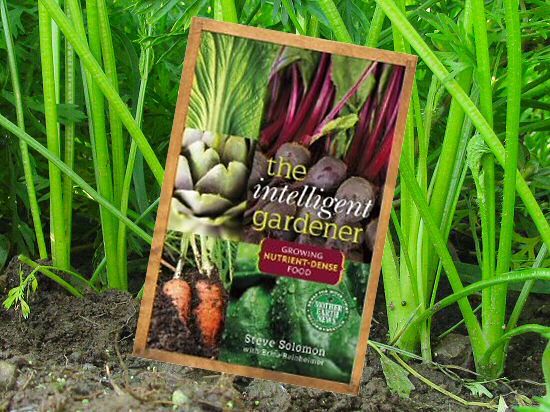
More winter reading , and the buzzword is…”remineralization,” which here means carefully replacing missing soil minerals in a holistic way (as opposed to just topping up with this or that). The other keyphrase is what that leads to: “nutrient-dense food.” The book is The Intelligent Gardener by Steve Solomon, published only a couple of months ago. I heard about it chatting with Shannon, and read it while visiting their farm in Nova Scotia, last week or so. Only a few pages in, it became a kind of tipping point experience for me. Where I used to happily rely on cow manure and compost, thinking about soil chemistry only in bits and pieces, now I find myself suddenly quite FOCUSED on the arcane details of cation exchange capacity, sample extraction methods, and the like… Odd!
“Skepticism is a healthy attitude when it comes to taking garden advice,” says the preface, and then the book takes off on a kinda wild ride through Solomon’s world of soil and fertility, including interesting attacks on popular beliefs in organic growing, like the reverence for compost, and in general, the organic practices promoted by Rodale to millions of North American gardeners. The main purpose of the book, though, is to provide practical and easy-to-follow, soil test-based remineralization instructions. Which it does.
Definitely worth a read, and quite possibly a game-changer depending on how you manage your own garden dirt. More to follow…and my tubular soil sampling probe should soon be on its way!




found ss long ago here. lots of good stuff been composting 20 years and follow fertilizing steve put forth meals, etc
http://www.soilandhealth.org/index.html
Cool. I joined the Soil and Health Yahoo group a couple of weeks ago, SS is on there. And I’ve gotten several books from the S&H library over the last few years, a great resource as they say.
I have not read the book, so I do not know exactly what his position is, but the reverence for compost in organic agriculture goes beyond the matter of plant nutrition; it’s really about soil microbiology, actually. It’s true that compost does not provide a balanced plant nutrition (too much phosphorus, not enough nitrogen), yet, the benefits are still quite observable. The funny thing is that, if you run down the number, the amount we spread is completely negligible vs the volume of soil. Objectively, the typical compost application should not have much of an impact, and yet, it does. It’s magic! :)
Lately, I have been taking an interest in the role of earthworms and mycorrhiza in fertility, both of which are not quite compatible with the constant tilling we do in growing vegetables. A no-till system would be perfect, but I do not think it would work particularly well at my scale. The solution, I think, is long-term (18 months+) undisturbed green manure. But for me, until I have gotten on top of perennial weeds, it’s not really a possibility.